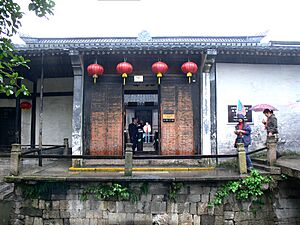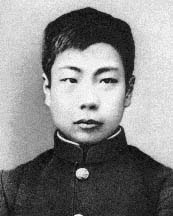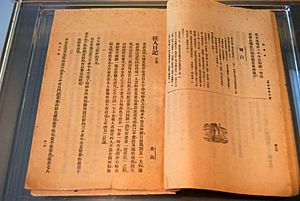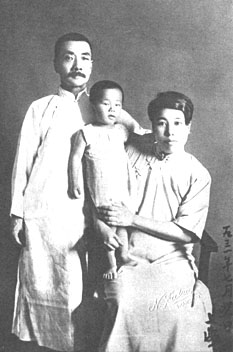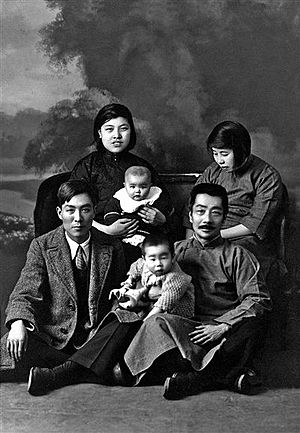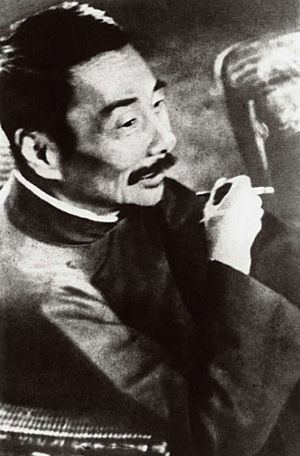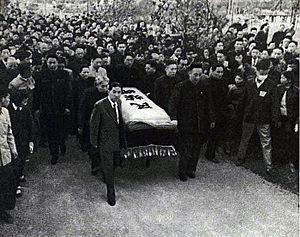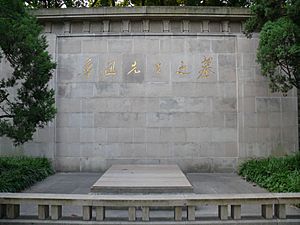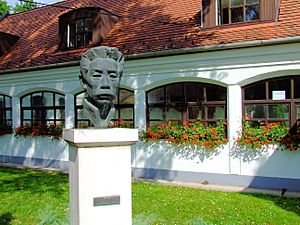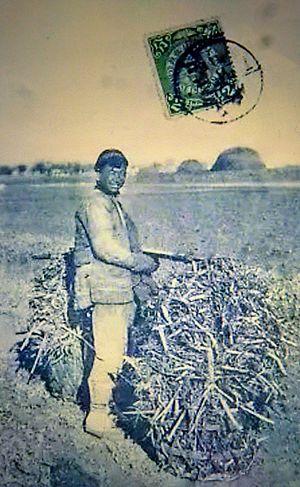Lu Xun facts for kids
Quick facts for kids
Lu Xun
|
|||||||||||||||||||||||||||||||
|---|---|---|---|---|---|---|---|---|---|---|---|---|---|---|---|---|---|---|---|---|---|---|---|---|---|---|---|---|---|---|---|
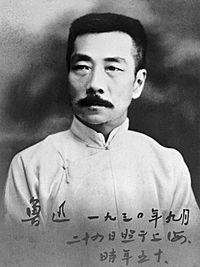 |
|||||||||||||||||||||||||||||||
| Native name |
周树人 (Zhou Shuren)
|
||||||||||||||||||||||||||||||
| Born | Zhou Zhangshou 25 September 1881 Shaoxing, Zhejiang, Qing Empire |
||||||||||||||||||||||||||||||
| Died | 19 October 1936 (aged 55) Shanghai, Republic of China |
||||||||||||||||||||||||||||||
| Resting place | Tomb of Lu Xun, Lu Xun Park, Hongkou District, Shanghai | ||||||||||||||||||||||||||||||
| Pen name | 鲁迅 (Lu Xun) | ||||||||||||||||||||||||||||||
| Occupation |
|
||||||||||||||||||||||||||||||
| Language | Written vernacular Chinese | ||||||||||||||||||||||||||||||
| Nationality | Chinese | ||||||||||||||||||||||||||||||
| Alma mater | Jiangnan Naval Academy School of Mines and Railways Sendai Medical Academy |
||||||||||||||||||||||||||||||
| Period | 1903–1936 | ||||||||||||||||||||||||||||||
| Subject | Criticism of traditional Chinese Confucian society, values and thought | ||||||||||||||||||||||||||||||
| Literary movement | New Culture Movement May Fourth Movement |
||||||||||||||||||||||||||||||
| Years active | 1918-1936 | ||||||||||||||||||||||||||||||
| Notable works |
|
||||||||||||||||||||||||||||||
| Spouse | Zhu An | ||||||||||||||||||||||||||||||
| Partner | Xu Guangping (1927–1936) | ||||||||||||||||||||||||||||||
| Children | 1 | ||||||||||||||||||||||||||||||
| Signature | |||||||||||||||||||||||||||||||
 |
|||||||||||||||||||||||||||||||
| Chinese name | |||||||||||||||||||||||||||||||
| Traditional Chinese | 魯迅 | ||||||||||||||||||||||||||||||
| Simplified Chinese | 鲁迅 | ||||||||||||||||||||||||||||||
|
|||||||||||||||||||||||||||||||
| Zhou Shuren | |||||||||||||||||||||||||||||||
| Traditional Chinese | 周樹人 | ||||||||||||||||||||||||||||||
| Simplified Chinese | 周树人 | ||||||||||||||||||||||||||||||
|
|||||||||||||||||||||||||||||||
Zhou Shuren (born September 25, 1881 – died October 19, 1936), known as Lu Xun, was a very important Chinese writer. He was a leading figure in modern Chinese literature. He wrote short stories, essays, and was also a literary critic and translator.
Lu Xun wrote in both everyday Chinese (vernacular Chinese) and older, formal Chinese (classical Chinese). In the 1930s, he led the League of Left-Wing Writers in Shanghai. This was during a time when China was a republic (1912-1949).
Lu Xun was born into a wealthy family in Shaoxing, Zhejiang. However, his family's money decreased as he grew up. He wanted to take special government exams, but his family's money problems made him go to government schools that taught "foreign education."
After graduating, Lu Xun went to medical school in Japan but later left. He became interested in literature. He had to return to China because his family ran out of money. Back in China, he taught at schools and colleges. Later, he got a job at the Republic of China Ministry of Education.
After the May Fourth Movement in 1919, Lu Xun's writing became very influential. He was seen as a hero by the Chinese government after 1949. Mao Zedong admired his writing greatly. Even though he liked socialist ideas, Lu Xun never joined the Communist Party of China.
Contents
Lu Xun's Life Story
Early Life and Family
Lu Xun was born in Shaoxing, Zhejiang. Like many people in old China, he had many names. His birth name was "Zhou Zhangshou." He later chose "Shuren" as his given name, which means "to be an educated man."
The name "Lu Xun" was a pen name he picked when his story "Diary of a Madman" was published in 1918. The "Lu" in his pen name was his mother's family name.
His family had been rich for a long time through land and money lending. His grandfather, Zhou Fuqing, held a high position in the government. Lu Xun's mother taught herself to read and write, even though girls usually didn't get formal education back then.
Lu Xun's early schooling focused on old Chinese teachings. He found these subjects boring. He preferred folk stories, local operas, and ghost stories told by his servant, Ah Chang.
His family's wealth started to decline when his father tried to bribe an official in 1893. His grandfather was arrested and put in prison. The family had to pay a lot of money to keep him from being executed. His grandfather was finally released in 1901.
After this, Lu Xun's father became ill and died in 1896 at age 35.
His Education Journey
Lu Xun tried the traditional government exams once in 1899 but then stopped. He wanted to go to a good school in Hangzhou. But his family's money problems made him attend a free military school in Nanjing.
His mother was sad about his choice, and some relatives looked down on him. He left the military school after half a year. He didn't want to work in an engine room below deck. He also felt the teaching quality was poor.
Lu Xun then went to another government-funded school, the "School of Mines and Railways." He graduated in 1902. Here, he learned about foreign literature, philosophy, and science. He also studied English and German. Reading novels about social problems influenced his later ideas.
He did well in school without much effort. He sometimes faced racism from Manchu students, which might have made him feel more Chinese nationalism. After graduating, Lu Xun planned to become a doctor.
Studying Medicine in Japan
In 1902, Lu Xun went to Japan on a scholarship to study medicine. He attended a language school first. He cut off his traditional Chinese braid (which all Chinese men had to wear) and practiced jujutsu. He also translated foreign novels like Jules Verne's From the Earth to the Moon.
In 1904, Lu Xun started studying at the Sendai Medical Academy. He found his studies hard because his Japanese wasn't perfect. He became friends with his professor, Fujino Genkurō, who helped him with notes. Lu Xun's classmates accused him of getting special help.
Lu Xun wrote an essay called "Mr Fujino" about his respectful feelings for his teacher. This essay is now taught in middle schools in China.
In March 1906, Lu Xun suddenly left medical school. He didn't tell anyone. He went to Tokyo and started reading Nietzsche, a German philosopher. His essays from this time were influenced by Nietzsche's ideas.
In June 1906, Lu Xun's mother tricked him into returning home. She wanted him to marry a girl named Zhu An in an arranged marriage. Zhu An was illiterate and had bound feet. Lu Xun married her but never had a romantic relationship with her. He still took care of her financially for the rest of his life.
A few days after the wedding, Lu Xun went back to Japan with his younger brother. He took informal literature and history classes. He tried to start a literary journal, but it failed. He and his brother published translations of Western fiction, but they didn't sell well.
Becoming a Writer
In 1909, Lu Xun wanted to study in Germany but didn't have enough money. He had to return to China. From 1909 to 1911, he taught at colleges and schools. He didn't enjoy these jobs. He also collected old books and studied Chinese fiction.
In 1911, he went back to Japan to bring his brother, Zuoren, home to help with family money. He wrote his first short story, Nostalgia, but threw it away because he was disappointed. His brother saved it and had it published later.
In February 1912, after the Xinhai Revolution ended the old Qing dynasty, Lu Xun got a job at the national Ministry of Education. He moved to Beijing and worked there until 1926. He helped improve the Beijing Library and set up the Natural History Museum.
He also helped design the Twelve Symbols national emblem in 1912. He wrote a book on the history of Shaoxing and a book about ancient Chinese fiction.
In 1917, a friend asked Lu Xun to write for New Youth, a new literary magazine. Lu Xun was unsure if his writing could help society. He said, "Imagine an iron house... full of sound sleepers – all about to suffocate to death. Let them die in their sleep, and they will feel nothing. Is it right to cry out... causing them inconsolable agony before they die?" His friend replied that it was right, because "there was still hope – hope that the iron house may one day be destroyed."
Soon after, in 1918, Lu Xun wrote his first famous short story, "Diary of a Madman". This story was praised for its new ideas. Lu Xun became known as a leading writer of the New Culture Movement. He wrote his most famous stories for New Youth until 1921. These stories were later collected in a book called Nahan (Outcry).
In 1919, Lu Xun moved his family to Beijing. In 1920, he started lecturing part-time at universities like Peking University. His lecture notes were published as A Brief History of Chinese Fiction. In 1925, he started a journal called Wilderness to support young writers.
Lu Xun's works, like "Diary of a Madman" and Ah Q, used a fresh and direct language. They often focused on country peasants.
In 1925, Lu Xun started a relationship with Xu Guangping, one of his students. In 1926, he had to leave Beijing because he supported student protests. He moved to Xiamen and taught at Xiamen University. There, he wrote his last collection of fiction, Old Tales Retold, and his autobiography, Dawn Blossoms Plucked at Dusk.
In 1927, he and Xu moved to Guangzhou. He became head of the Chinese literature department at Zhongshan University. He tried to help students who were arrested but failed. This made him resign, and he moved to Shanghai in September 1927. By then, he was one of China's most famous thinkers.
Lu Xun was considered for the Nobel Prize in Literature for his story The True Story of Ah Q. But he turned down the idea. He later stopped writing fiction and poetry. He focused on writing essays about China's problems.
Later Years and Legacy
In 1929, Lu Xun's son, Haiying, was born. Haiying was his only child. After moving to Shanghai, Lu Xun became a full-time writer. He earned a good income from his writing.
He became interested in Marxist political ideas. In 1930, he helped start the League of Left-Wing Writers. This group aimed to support writers with leftist views. However, there were often disagreements among its members.
In 1931, the government passed strict censorship laws. Writers could be jailed or executed for "endangering the public." Lu Xun had to hide. Many writers were executed, which made Lu Xun strongly against the government.
In 1933, Lu Xun met Edgar Snow, an American journalist. Snow asked if there were still people like "Ah Q" (a character from Lu Xun's famous story) in China. Lu Xun replied, "It's worse now. Now it's Ah Q's who are running the country."
Lu Xun continued to write essays for different magazines. In 1934, he published his last short story collection, Old Tales Retold. In 1935, he sent a message to Communist forces, congratulating them on their Long March. He refused to write a novel about the communist revolution because he felt he didn't know enough about it.
Lu Xun was a heavy smoker, which affected his health. By 1936, he had a serious lung illness. He became very thin. A month before he died, he wrote: "Hold the funeral quickly... do not stage any memorial services. Forget about me, and care about your own life." He also wrote about his son: "On no account let him become a good-for-nothing writer or artist."
Lu Xun's Death
Lu Xun died on October 19, 1936, at 5:11 am. He was 55 years old. He was buried in Lu Xun Park in Shanghai. Mao Zedong later wrote an inscription above his tomb.
Lu Xun's son, Zhou Haiying, survived him. After his death, Lu Xun was made a member of the Communist Party for his contributions to the May Fourth Movement.
His Lasting Influence
Nobel Prize winner Kenzaburō Ōe called Lu Xun "The greatest writer Asia produced in the 20th century." After Lu Xun's death, Mao Zedong called him "the saint of modern China." Mao used Lu Xun's legacy to support his own political goals.
After the People's Republic of China was founded in 1949, Lu Xun's works were seen as examples of communist literature. However, many of his close friends were later removed from power. Mao admitted that if Lu Xun had lived until the 1950s, he would have "either gone silent or gone to prison."
Lu Xun's satirical writing style was later discouraged. In 2007, some of his sadder works were removed from school textbooks. Some believe this was to stop young people from having Lu Xun's critical habits.
During the Cultural Revolution, the Communist Party praised Lu Xun. But they also suppressed the very intellectual freedom and writing style he stood for. Today, some of his essays are required reading in Chinese schools.
Lu Xun translated many books, especially from Russian. He admired Nikolai Gogol, and his first story, "Diary of a Madman," was inspired by Gogol's story of the same name. As a left-wing writer, Lu Xun played a key role in modern Chinese literature. His books are still very popular in China and worldwide.
Lu Xun's works were banned in Taiwan until the late 1980s because of his leftist political views. He also supported the Esperanto movement in China, which aimed to create a universal language.
Lu Xun's importance comes from his contributions to almost every modern literary form. He wrote in a clear style that influenced many writers. His short story collections, Nahan (Call to Arms) and Panghuang (Wandering), are considered classics. His translations of foreign literature were important when such books were rare.
His work is also studied outside China. Some compare him to Nietzsche, another famous philosopher.
- A major literature prize in China, the Lu Xun Literary Prize, is named after him.
- An asteroid, 233547 Luxun, is named after him.
- A crater on Mercury, Lu Hsun, is named after him.
- The artist Shi Lu used part of Lu Xun's pen name because he admired him.
Lu Xun's Writing Style
Lu Xun was a very flexible writer. He used both traditional Chinese ways of writing and European styles from the 1800s. His writing could be both "sympathetic" and "ironic." His essays often sharply criticized society.
In his stories, he was a master of everyday language and tone. This makes some of his works, like "The True Story of Ah Q," hard to translate. He often balanced criticizing his characters' mistakes with understanding them. Lu Xun was great at irony and satire. He could also write very direct prose, like in "My Old Home."
Mao Zedong considered Lu Xun the most influential Chinese writer linked to the May Fourth Movement. Lu Xun strongly criticized China's social problems and the "Chinese national character." Some called him a "champion of common humanity."
Lu Xun felt that the 1911 Xinhai Revolution had failed. In 1925, he said he felt like a slave before the revolution, and then cheated by other slaves afterward. He was disappointed with the new government, seeing it as ineffective. He believed that "revolutionary men" were needed to lead change with force.
Images for kids
See also
 In Spanish: Lu Xun para niños
In Spanish: Lu Xun para niños
 | Ernest Everett Just |
 | Mary Jackson |
 | Emmett Chappelle |
 | Marie Maynard Daly |


